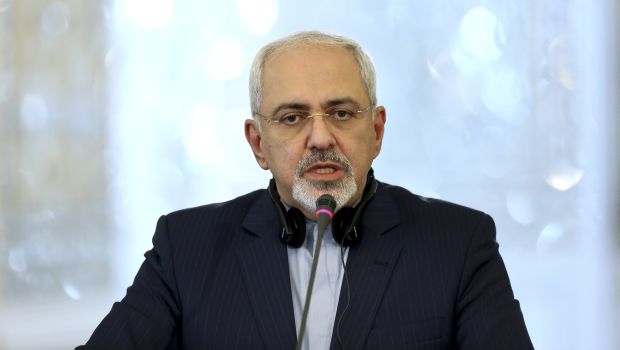
Iran’s Foreign Minister Mohammad Javad Zarif holds a joint press conference with his Russian counterpart Sergey Lavrov in Tehran, Iran, Wednesday, December 11, 2013. (AP Photo/Ebrahim Noroozi)
London, Asharq Al-Awsat—Iran’s foreign minister said on Sunday that Iran would continue with the international negotiations over its nuclear program, despite mounting anger in Tehran over Washington’s decision last week to add 19 Iranian companies and individuals to its blacklist of sanctioned entities.
In a post on his Facebook page, Foreign Minister Mohammad Javad Zarif wrote that his country will continue negotiating with the P5+1, the five permanent members of the UN Security Council plus Germany, over Iran’s controversial nuclear program.
“We are pursuing the negotiations seriously and of course we will give a well-considered, purposeful, smart and proper reaction to any inappropriate and unconstructive move,” the Facebook post reads.
“The negotiations and achieving a result are difficult tasks and will definitely bring a lot of ups and downs. We have predicted that from the very beginning,” Zarif continued.
The US accused the newly-blacklisted 19 Iranian companies and individuals of being involved in Iran’s nuclear and ballistic missile development programs.
Many in Iran see the recent move by the US as a breach of the interim agreement on Iran’s nuclear program signed between the Islamic Republic and the P5+1 in Geneva on November 25, which stipulated that no new sanctions would be imposed on Iran for six months.
In response to criticism that the blacklisting endangered the nuclear deal, senior US officials argued that it was carried out within the framework of the existing sanctions regime and did not constitute “new” measures.
Tehran daily Keyhan, a title aligned with Iran’s government and which has been consistently sceptical about the international nuclear negotiations, published an editorial on Saturday claiming that the latest development was the final nail in the coffin for Iran’s attempts to reach an accord with the US and its allies over the Islamic Republic’s controversial nuclear program.
“In its documented reports and articles, Keyhan has recently warned many times against the deceptive approach by the western side in this interim deal and showed that the US is untrustworthy,” the newspaper wrote, adding that “the recent events confirmed [Keyhan’s] stance.”
In Sunday’s Facebook post, Zarif vowed to reply at “an appropriate time” to domestic critics who were using his “necessary silence” to voice their displeasure at the recent nuclear deal reached with the six world powers in Geneva.
“Some friends who were not happy with the Geneva joint action program have already announced its premature death, which is more an expression of their desire than the truth,” he added.
Expert-level talks between Iran and the P5+1 broke up on Friday, though an EU spokesman said they had ended so all parties could consult with their capitals.
“After four days of lengthy and detailed talks, reflecting the complexity of the technical issues discussed, it became clear that further work is needed,” said Michael Mann, spokesman for EU foreign policy chief Catherine Ashton, who played a key role in brokering the Geneva agreement.
In response to the blacklisting, the Iranian parliament’s National Security and Foreign Policy Committee announced it would hold special meetings on the issue within the next two weeks.
Chairman of the Committee Alaeddin Boroujerdi approved the move by the Iranian foreign ministry to recall the negotiating team from Vienna on Friday, calling it a “just and revolutionary act.”
Speaker of Iran’s Parliament Ali Larijani told reporters on Sunday that the move violated the spirit of the agreement reached in Geneva. “The move does only not ease [the sanctions],” he said. “But also creates misunderstanding.”
